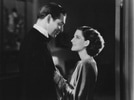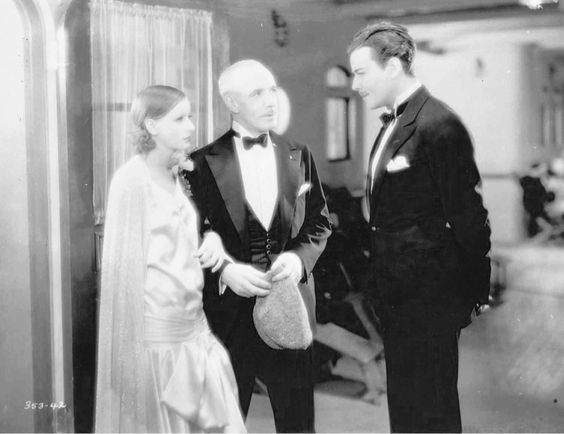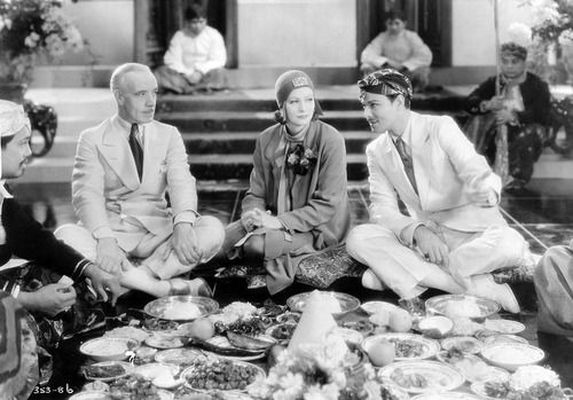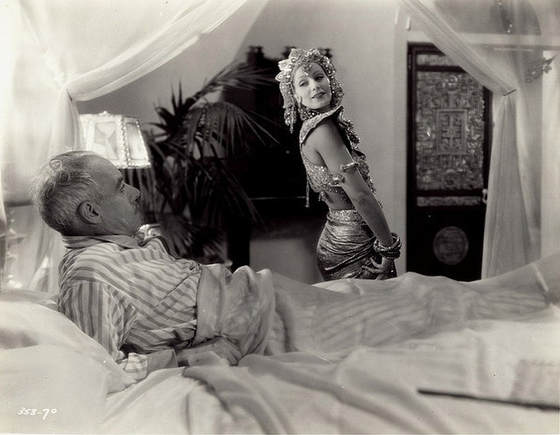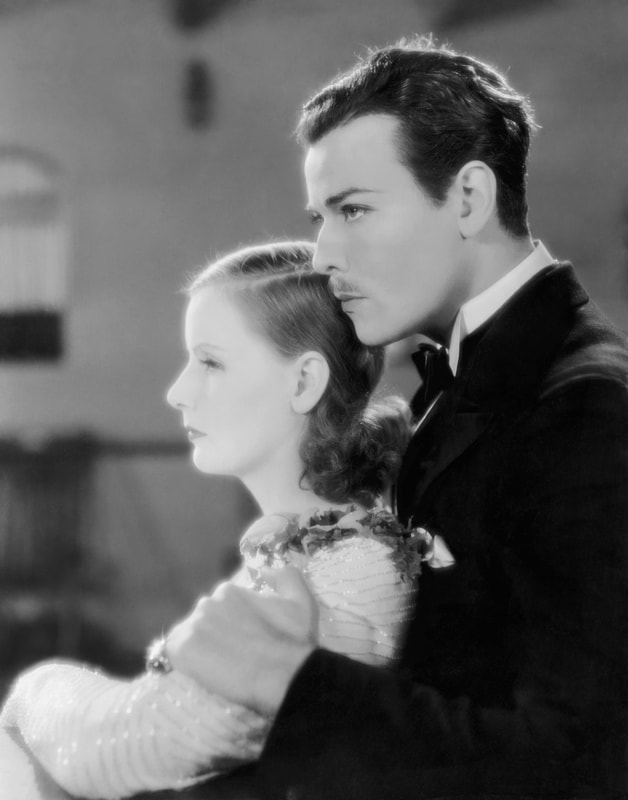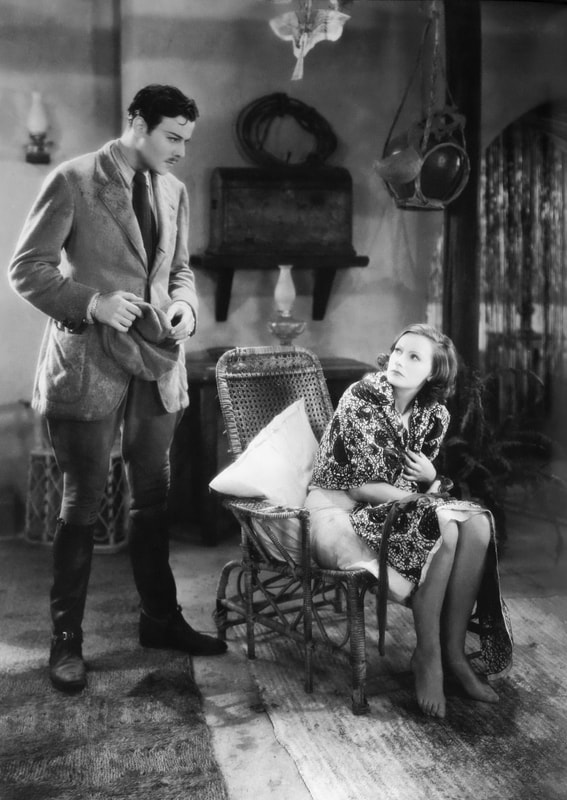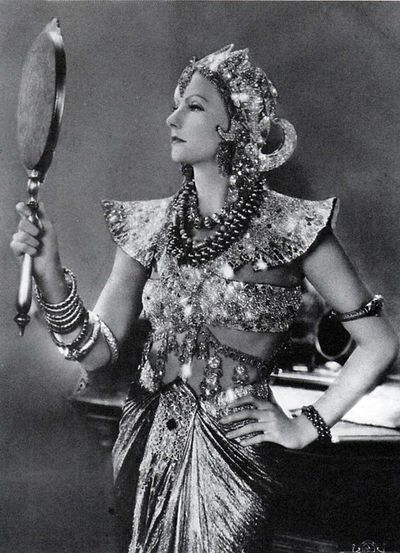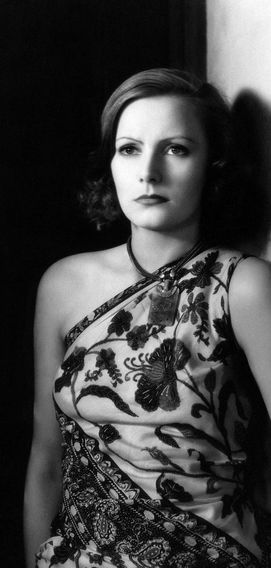Plot:
Happily married Lillie Sterling (Garbo) embarks on a voyage to Java with her inattentive husband John (Stone), who is intent on buying a coffee plantation. On the ship the couple meets a prince from Java (Asther), who is intent on seducing Lillie while offering his hospitality to John. Once in Java, John is concerned with only 2 things, finding a suitable plantation & killing a tiger, which allows the price to fully seduce Lillie, who reluctantly gives in once it is clear her husband is fully preoccupied. On a tiger hunt John recognizes that his wife has been unfaithful and attempts to kill the prince, but is only successful in injuring him, thus leading John to pack his things and leave his wife behind. Until the final shot it is unclear what Lillie’s decision will be.
Happily married Lillie Sterling (Garbo) embarks on a voyage to Java with her inattentive husband John (Stone), who is intent on buying a coffee plantation. On the ship the couple meets a prince from Java (Asther), who is intent on seducing Lillie while offering his hospitality to John. Once in Java, John is concerned with only 2 things, finding a suitable plantation & killing a tiger, which allows the price to fully seduce Lillie, who reluctantly gives in once it is clear her husband is fully preoccupied. On a tiger hunt John recognizes that his wife has been unfaithful and attempts to kill the prince, but is only successful in injuring him, thus leading John to pack his things and leave his wife behind. Until the final shot it is unclear what Lillie’s decision will be.
Thoughts:
Garbo was the quintessential ‘exotic’ movie star and even before she spoke in Anna Christie (‘30) her ‘foreigness’ was evident in every performance. How then was she cast as a happily married wife of an older man whose 3 main priorities were business , killing a Tiger, & more business? I’d like to think that the basic premise, a bored wife strays into the willing arms of a dashing price, was the selling point because it falls in line with her more willful and independent characters in films like Camille (’36), Queen Christina (’33) & The Temptress (’26), as well as the carefully developed persona crafted by MGM. Wild Orchids, however, seems to stands alone in the Garbo canon in trying to reign in the exotic and make her a more ‘normal’ and pedestrian character.
The ironic thing about Wild Orchids is that is pushes & pulls against Garbo’s image at its core, but settles for the pedestrian to the detriment of the film. The opening scene firmly places Garbo in a glamorous state, first as her car is surrounded by well-wishers, reminiscent of typical Garbo public appearances, and then as she is whisked through the sea of people onto a boat where she is cheered. What grounds the opening, however, is the presence of her husband, a wealthy man much older than she, who seems more concerned with insignificant details than in his beautiful wife. This, of course, sets the tone for the entire movie as John repeatedly misses opportunities for intimacy or to express his love for Lillie, instead worrying if a water bottle is packed or a telegraph has been sent. Yes Lillie is glamourous, but she too suffers from the everyday tragedy of not being loved.
After the tenor of the Sterling’s marriage has been set, the introduction of the prince as a brutal and violent man again moves the film back to the exotic. He whips & berates a servant as Lillie looks on in horror and fear, but is there excitement behind her eyes? Initially it would seem no, but as the prince becomes more civil and her coolness warms, perhaps that excitement plays a part in her submission. Asther is brilliant as the prince, never letting his leering and manipulation of John undermine his overall charming performance. As the prince further ingratiates himself with John, Lillie is reluctant to engage, until her husband leaves her alone and the prince pounces. At this point Garbo has expressed her disgust and dismay towards the prince, rooted in the conventional and dedicated to her husband. But once the prince kisses her and she pulls away, there is a softening that sways the film back to the possibilities of the exotic and the abnormal. A little touch of suspense is introduced as well when John appears to catch the couple near the end of their kiss, but his character quickly reverts back to the mundane as it is revealed his anger is caused by a missing hunting outfit. The damage, so to speak, has been done however, because Lillie’s passion has been unleashed, if only for a brief moment.
Trying her best to tamp her desire down, Lillie makes every effort to capture her husband’s attentions, whether it be offering to stay in their state room, with the implied offer of sex, or later on putting on a native costume to entice her husband sexually. In both instances she is met with at first disinterest, and then disdain, as her husband barks at her “what in heaven’s name have you got on? Take off that junk and go back to bed.” It is in this costume, which appears about midway in the film, that stretches Lillie to the outer limits of Garbo’s personae. She is clothed in a revealing native costume that was given to her by her potential lover, but she is instead offering herself sexually to her husband. She cannot be bad, for she still loves her husband, but she cannot be good either in her wonton sexual appearance and actions. Wild Orchids wants it both ways. In fact the title and Lillie’s action are explained away when the prince tells Lillie that in Java the orchids grow wild and all women lose their inhibitions and pretense because of the overwhelming scent.
When the prince comes to her room later that night she is still in the costume & has no option but to give in, his shadow falling across her as she stands on a balcony until he literally swallows her up in darkness. Lillie’s will has been broken and she surrenders to infidelity, not fighting back the kiss, but ultimately running away before anything more serious can happen. Her broken will is further reinforced the following day when she refuses to stay at the palace with the prince while her husband leaves to survey plantations. She doesn’t trust herself or the prince, who slyly angles his way on the plantation excursion with the couple. When a rainstorm drenches the group and they stay over at a cottage, John puts business before his wife and leaves Lillie & the prince alone together, with the price cheerfully noting “your husband thought you’d be safer if I stayed behind with you.”
Clearly she wouldn’t be safer, but John is again condemned to ignorance and indifference pushing his wife into the waiting arms of the prince. Again, she attempts to control her desire for the prince, this time hiding in her bedroom all day. The struggle for normalcy and tradition are strong in Lillie, but so too is her need for love. Finally, when she comes out of the room the inevitable embrace & another kiss transpire and she succumbs yet again, but this time the discretion is projected onto a window blind & John happens to see the lovers’ silhouette. The image as a projection is particularly important because it seems as if only through appearing larger than life would John have recognized the infidelity. It also helps enforce Garbo’s ‘other-ness’ as larger than life.
Using a lost necklace as proof beyond a reasonable doubt of his wife’s infidelity, John sets out to kill the prince, insisting they all go on the promised tiger hunt. While on the hunt the prince brazenly flaunts his affection towards Lillie, kissing her while John naps nearby. The exotic is on full display & Lillie/Garbo have defied convention and normalcy for secrecy and lies. The ‘tiger’ has been loosed and only the hunter can cage or kill it. Lillie’s discovery of the necklace, however, alerts her to John’s plans and the real reason behind the hunt. Although John is able to lure the prince away from camp with an unloaded gun, he cannot let the tiger kill the prince and shoots the tiger dead, saving the prince. Lillie rushes to the injured prince, unafraid of showing her true feelings now that everything is out in the open. She has fully crossed over from convention and respectability.
I noted that Wild Orchids wanted it both ways by careening back & forth between Garbo’s exotic personae & the conventions put upon her character Lillie. Ultimately, the final shot has Lillie winning out & conventions restored, even though nothing that came before it warranted such a result. Her final admission to John that “you’re the only man I’ve ever loved” seems without proof and certainly without merit because he is the only character who hasn’t changed throughout the picture. Her love is unrequited and misplaced, which ultimately undermines the very institution it is meant to enforce: marriage.
Garbo was the quintessential ‘exotic’ movie star and even before she spoke in Anna Christie (‘30) her ‘foreigness’ was evident in every performance. How then was she cast as a happily married wife of an older man whose 3 main priorities were business , killing a Tiger, & more business? I’d like to think that the basic premise, a bored wife strays into the willing arms of a dashing price, was the selling point because it falls in line with her more willful and independent characters in films like Camille (’36), Queen Christina (’33) & The Temptress (’26), as well as the carefully developed persona crafted by MGM. Wild Orchids, however, seems to stands alone in the Garbo canon in trying to reign in the exotic and make her a more ‘normal’ and pedestrian character.
The ironic thing about Wild Orchids is that is pushes & pulls against Garbo’s image at its core, but settles for the pedestrian to the detriment of the film. The opening scene firmly places Garbo in a glamorous state, first as her car is surrounded by well-wishers, reminiscent of typical Garbo public appearances, and then as she is whisked through the sea of people onto a boat where she is cheered. What grounds the opening, however, is the presence of her husband, a wealthy man much older than she, who seems more concerned with insignificant details than in his beautiful wife. This, of course, sets the tone for the entire movie as John repeatedly misses opportunities for intimacy or to express his love for Lillie, instead worrying if a water bottle is packed or a telegraph has been sent. Yes Lillie is glamourous, but she too suffers from the everyday tragedy of not being loved.
After the tenor of the Sterling’s marriage has been set, the introduction of the prince as a brutal and violent man again moves the film back to the exotic. He whips & berates a servant as Lillie looks on in horror and fear, but is there excitement behind her eyes? Initially it would seem no, but as the prince becomes more civil and her coolness warms, perhaps that excitement plays a part in her submission. Asther is brilliant as the prince, never letting his leering and manipulation of John undermine his overall charming performance. As the prince further ingratiates himself with John, Lillie is reluctant to engage, until her husband leaves her alone and the prince pounces. At this point Garbo has expressed her disgust and dismay towards the prince, rooted in the conventional and dedicated to her husband. But once the prince kisses her and she pulls away, there is a softening that sways the film back to the possibilities of the exotic and the abnormal. A little touch of suspense is introduced as well when John appears to catch the couple near the end of their kiss, but his character quickly reverts back to the mundane as it is revealed his anger is caused by a missing hunting outfit. The damage, so to speak, has been done however, because Lillie’s passion has been unleashed, if only for a brief moment.
Trying her best to tamp her desire down, Lillie makes every effort to capture her husband’s attentions, whether it be offering to stay in their state room, with the implied offer of sex, or later on putting on a native costume to entice her husband sexually. In both instances she is met with at first disinterest, and then disdain, as her husband barks at her “what in heaven’s name have you got on? Take off that junk and go back to bed.” It is in this costume, which appears about midway in the film, that stretches Lillie to the outer limits of Garbo’s personae. She is clothed in a revealing native costume that was given to her by her potential lover, but she is instead offering herself sexually to her husband. She cannot be bad, for she still loves her husband, but she cannot be good either in her wonton sexual appearance and actions. Wild Orchids wants it both ways. In fact the title and Lillie’s action are explained away when the prince tells Lillie that in Java the orchids grow wild and all women lose their inhibitions and pretense because of the overwhelming scent.
When the prince comes to her room later that night she is still in the costume & has no option but to give in, his shadow falling across her as she stands on a balcony until he literally swallows her up in darkness. Lillie’s will has been broken and she surrenders to infidelity, not fighting back the kiss, but ultimately running away before anything more serious can happen. Her broken will is further reinforced the following day when she refuses to stay at the palace with the prince while her husband leaves to survey plantations. She doesn’t trust herself or the prince, who slyly angles his way on the plantation excursion with the couple. When a rainstorm drenches the group and they stay over at a cottage, John puts business before his wife and leaves Lillie & the prince alone together, with the price cheerfully noting “your husband thought you’d be safer if I stayed behind with you.”
Clearly she wouldn’t be safer, but John is again condemned to ignorance and indifference pushing his wife into the waiting arms of the prince. Again, she attempts to control her desire for the prince, this time hiding in her bedroom all day. The struggle for normalcy and tradition are strong in Lillie, but so too is her need for love. Finally, when she comes out of the room the inevitable embrace & another kiss transpire and she succumbs yet again, but this time the discretion is projected onto a window blind & John happens to see the lovers’ silhouette. The image as a projection is particularly important because it seems as if only through appearing larger than life would John have recognized the infidelity. It also helps enforce Garbo’s ‘other-ness’ as larger than life.
Using a lost necklace as proof beyond a reasonable doubt of his wife’s infidelity, John sets out to kill the prince, insisting they all go on the promised tiger hunt. While on the hunt the prince brazenly flaunts his affection towards Lillie, kissing her while John naps nearby. The exotic is on full display & Lillie/Garbo have defied convention and normalcy for secrecy and lies. The ‘tiger’ has been loosed and only the hunter can cage or kill it. Lillie’s discovery of the necklace, however, alerts her to John’s plans and the real reason behind the hunt. Although John is able to lure the prince away from camp with an unloaded gun, he cannot let the tiger kill the prince and shoots the tiger dead, saving the prince. Lillie rushes to the injured prince, unafraid of showing her true feelings now that everything is out in the open. She has fully crossed over from convention and respectability.
I noted that Wild Orchids wanted it both ways by careening back & forth between Garbo’s exotic personae & the conventions put upon her character Lillie. Ultimately, the final shot has Lillie winning out & conventions restored, even though nothing that came before it warranted such a result. Her final admission to John that “you’re the only man I’ve ever loved” seems without proof and certainly without merit because he is the only character who hasn’t changed throughout the picture. Her love is unrequited and misplaced, which ultimately undermines the very institution it is meant to enforce: marriage.
Random Notes & Quotes:
*Cameraman William Daniels was known as Garbo’s personal lensman and shot most of her American features. He also shot Garbo’s disastrous first American screen test. He was upset when he was called to the studio to shoot it because he had a planned golf outing. He didn’t take the proper time to set the lighting and it didn’t look good, disappointing studio executives, who then ordered another, more successful test with another cameraman.
*Garbo’s Swedish mentor Mauritz Stiller died in Sweden during the production of Wild Orchids, but MGM head Louis B. Mayer refused to let her return home for the funeral. It only added to Garbo’s early dislike for American movie making.
*Garbo liked to watch daily rushes backwards for enjoyment, never liking to view her performances on screen.
